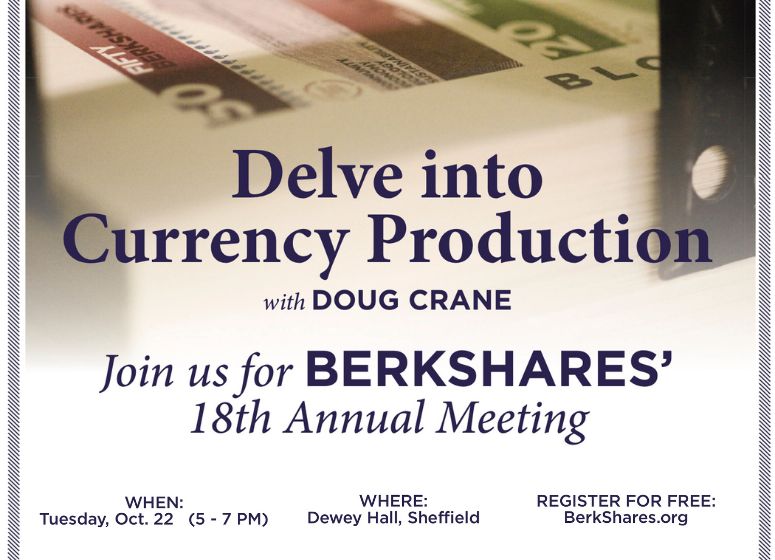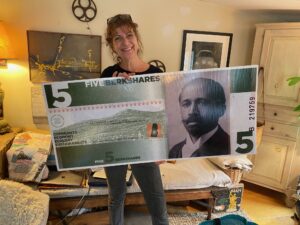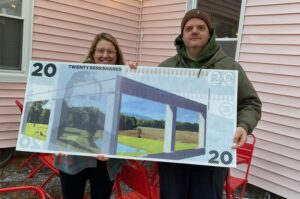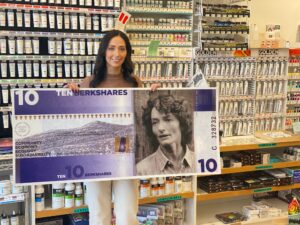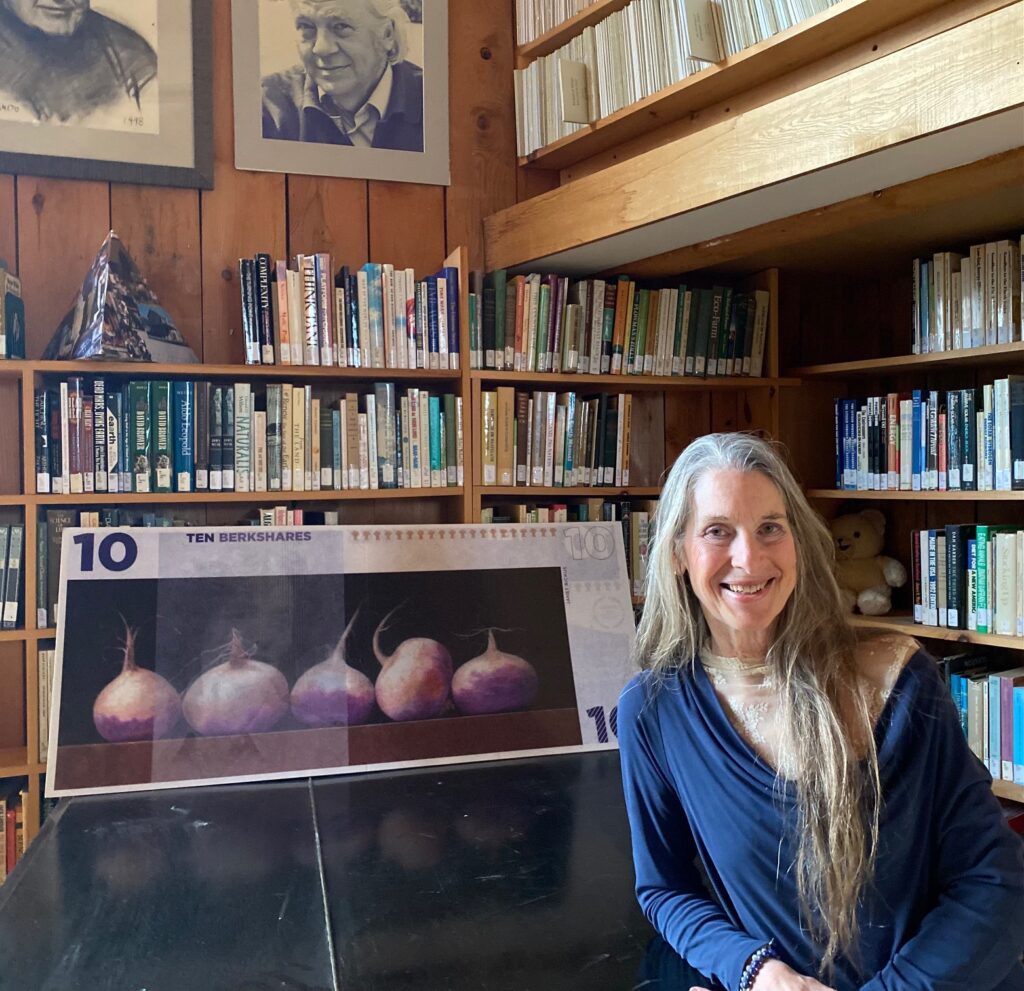
BerkShares March 2025 Business of the Month: Featuring BerkShares Board Members
By Katy Sparks
Earlier this month I had the chance to speak with three BerkShares board members working behind the scenes of this ambitious 20-year-old experiment in building a community-based currency. BerkShares was conceived of as a tool to support local environmentalism, democracy and culture as envisioned by the British economist E.F. Schumacher in his 1973 book, Small is Beautiful.
Today there are 300+ participating businesses that distinguish themselves as locally owned and community-minded participating in the BerkShares program. The currency empowers businesses to keep money circulating in this region which is defined as encompassing roughly 15 miles in any direction outside the borders of Berkshire County. You can visit the BerkShares Business Directory to learn about the diverse places you can spend the BerkShares in your wallet. Should you want to exchange to federal dollars, there is a modest 1.5% fee to do so. Personally, If I had excess BerkShares burning a hole in my pocket I would want to treat some friends to dinner at Blackberry River Bistro and Bakery in Canaan, CT or sign up for a CSA share at Indian Line Farm- there’s so many delightful ways to spend ‘em.
Beatrice Smith, Board Member:
Katy Sparks: Beatrice, what appealed to you about joining the board?
Beatrice Smith: I am a linguist by training, but I’ve always been interested in knowing where my food comes from. And I’ve also always been conscious of building community and being an active member of communities that I live it. So, joining BerkShares was an easy thing to do to build some community here.
KS: Have you ever worked with a local currency before?
BS: No, but I am originally from Ghana and one of the things that drew me to BerkShares is the alternative ways I had seen women in Ghana who owned small businesses pull together their micro resources to help the other vendors that might need it at the time. These women do not have credit lines with official banks, but they have peer to peer, market-woman to market-woman connections that they use to support one another and extend their resources. And the BerkShares local currency reminds me of this experience.
KS: And how do you to like spend your BerkShares?
BS: Using them in the community has made me more intentional about my shopping trips. When I make a shopping list and I know I’m going to Rubiner’s to get cheese, I make sure to check the BerkShares directory (which I keep in my purse) to see who else takes them on Main Street in Great Barrington. It’s made me make my lists more carefully. I have to look!
Susan Witt: Treasurer of the Board and Executive Director of The Schumacher Center for a new Economics
Katy Sparks: Susan, what would you say the foundational inspiration of creating this local currency has been?
Susan Witt: According to Schumacher, the most rational economic system is one in which locally produced goods are consumed locally rather than transporting goods over long distances. His argument was environmental and social: you could actually see how the goods being used in your home were made so it’s an opportunity to demand fair treatment of workers. And his argument was cultural: local goods reflect the unique culture of place.
We took Schumacher’s admonitions seriously and asked ourselves what are the tools that consumers can use to encourage that local economy? One of the tools is local financing and local currency. Keeping money circulating in the region as long as possible before it goes outside and that was the basis for our creating BerkShares.
KS: What are some opportunities to explore now that the currency has been around for almost 20 years? What’s next?
SW: In some breaking news, we recently created a state-chartered sister organization called BerkShares Local for educational purposes. BerkShares is a nonprofit but is not able to accept tax exempt donations so now we will be able to accept these important donations. Lacking this ability has been an inhibitor to raising funds so we’re excited that we now have a solution. Also, in the long run, BerkShares will need a digital payment platform. Once we have digital BerkShares we will have a universal basic income linked to the card. Having this initiative in the local currency would ensure that philanthropic giving stays in our local communities.
KS: Apart from the well over 300 businesses that accept BerkShares, what other community entities are the biggest supporters of the program?
SW: One of the strengths of this currency is that is works with local banks. It is not BerkShares Inc. issuing the currency out of a storefront but instead in partnership with local young banks that have themselves a record of reinvesting in the community. Lee Bank has an extraordinary record of local reinvestment. They’re the ones supporting your main street businesses and the mortgages for new families. That’s their mission. They take deposits and reinvest them locally in the Berkshires and we’re proud to work with them.
Leah Barber: Vice President of the Board
Katy Sparks: Leah, as the VP of the board, what are your goals for the program in 2025 and beyond?
Leah Barber: I’ve been rereading Small is Beautiful and looking at the book through the lens of a board member. Economics based on people and local productivity seems possibly more relevant today than when he wrote it in the 1970’s. We are in a time of reckoning right now and we’re all asking, “what can I do?” Maybe re-envisioning the economic ground that we stand on is one thing we can do. I’m really interested in creating more BTB (business to business) use of BerkShares and I also want everyone to become a member. It’s just 25 dollars (or BerkShares!) to join and it helps so much with our mission.
And in the immediate future I’d like to see us double the circulation that we currently have. That’s a pretty big ask but if we keep up with our educational efforts, we can get more businesses to accept them and then ask those businesses to really encourage their use. We have a table at the Great Barrington farmers market every other Saturday and we are positioned across from the market managers table where people can get BerkShares right there or at the Lee Bank just up the block on Main Street. But to go to scale, we need to go digital.
Facts about the currency:
From Susan Witt’s Presentation to the Roundtable on Credit Design & Community Development at Harvard Law School’s Money as a Democratic Medium 2.0 Conference, June 15-17, 2023.
There are currently over 140,000 B$ out in the area. Federal dollars remain on deposit to back all the notes in circulation. If merchants find they have too many BerkShares, they can trade them back for federal scrip at the same banks at a 1.5% fee or recirculate one to one. The fee is much lower than credit card fees so payments in BerkShares are preferred.”
Beautifully designed, the notes feature and honor historic figures from the Berkshires: a Stockbridge Mohegan Indian, representing the Berkshires’ native population, on the 1 BerkShare note; W. E. B. DuBois, founder of the N.A.A.C.P. and author of The Souls of Black Folks, a seminal work in African-American literature, on the 5; Robyn Van En, who founded the first Community Supported Agriculture (CSA) farm in the U.S. here in the Berkshires, on the 10; Herman Melville, author of the American classic Moby Dick and an early environmentalist, on the 20; and Norman Rockwell, beloved illustrator of small-town America, on the 50.

